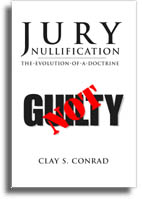
What Everyone Should Know About the
Powers of the Jury
Central to the history of trial by jury is the right of jurors to vote "not guilty" if the law is unjust or unjustly applied. When jurors acquit a factually guilty defendant, we say that the jury "nullified" the law. The Founding Fathers believed that juries in criminal trials had a role to play as the "conscience of the community," and relied on juries' "nullifying" to hold the government to the principles of the Constitution. Yet over the last century and a half, this power of jurors has been derided and ignored by American courts, to the point that today few jurors are aware that an important part of their role is, in the words of the Supreme Court, to "prevent oppression by the government." Published by Carolina Academic Press.
Clay S. Conrad is an attorney in private practice in Houston, Texas.
| This is the most important book on the independence of juries since Lysander Spooner's Trial by Jury in 1852. It is meticulously researched and balanced. The enjoyment of reading it stems as much from the beauty of Clay Conrad's writing as from the comprehensiveness of his analysis and the fascinating and important nature of his subject. |
|
--Randy E. Barnett Austin B. Fletcher Professor of Law, Boston University |
Contents: Preface; 1. Introduction; 2. The Origins of the Doctrine; 3. Revolutionary Times; 4. The Development of the Modern View; 5. The Modern Era; 6. The Current Debate; 7. Scapegoating the Jury; 8. The Capital Jury; 9. The Obligations of Jury Duty; 10. The Lawyer’s Challenge; 11. Summary; Index.